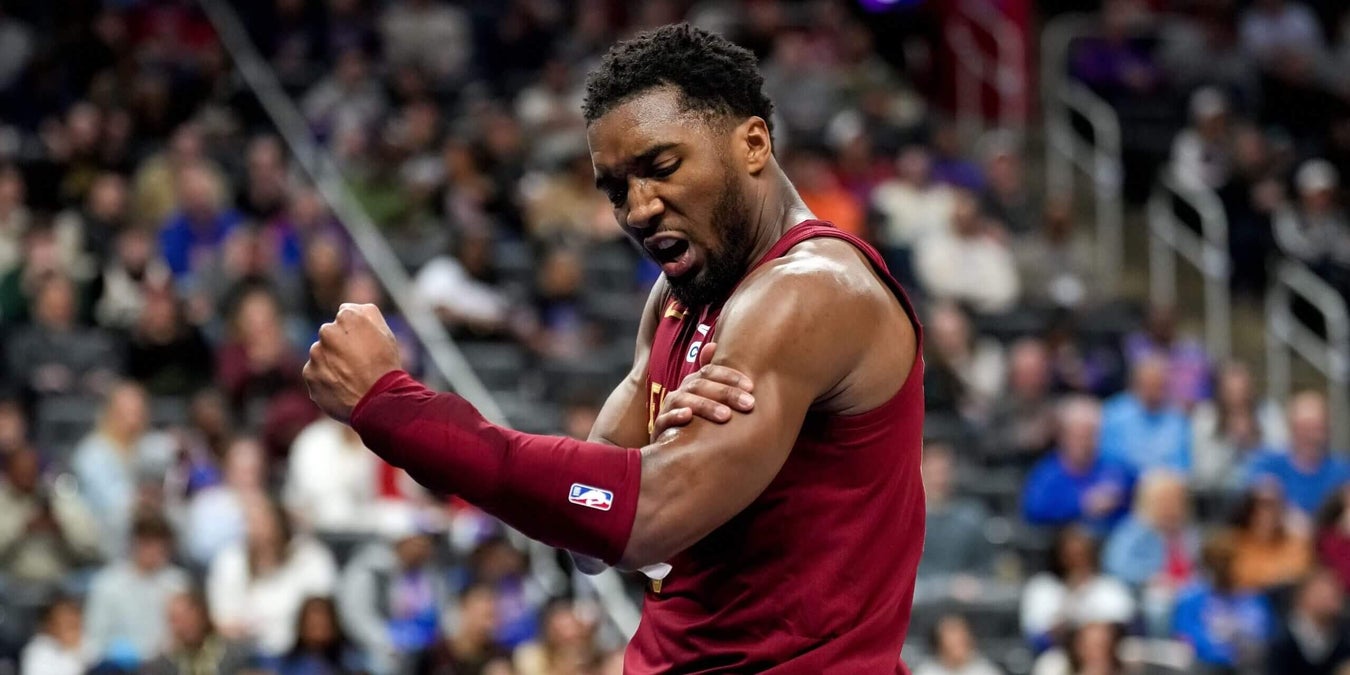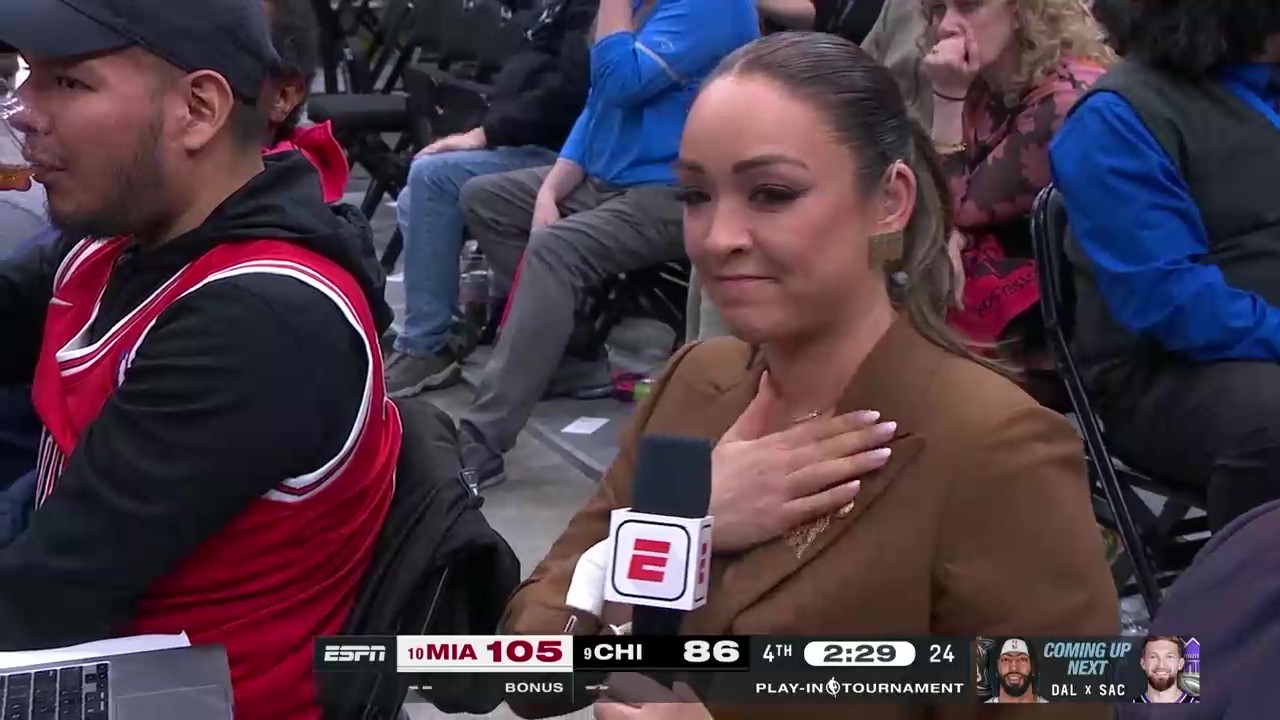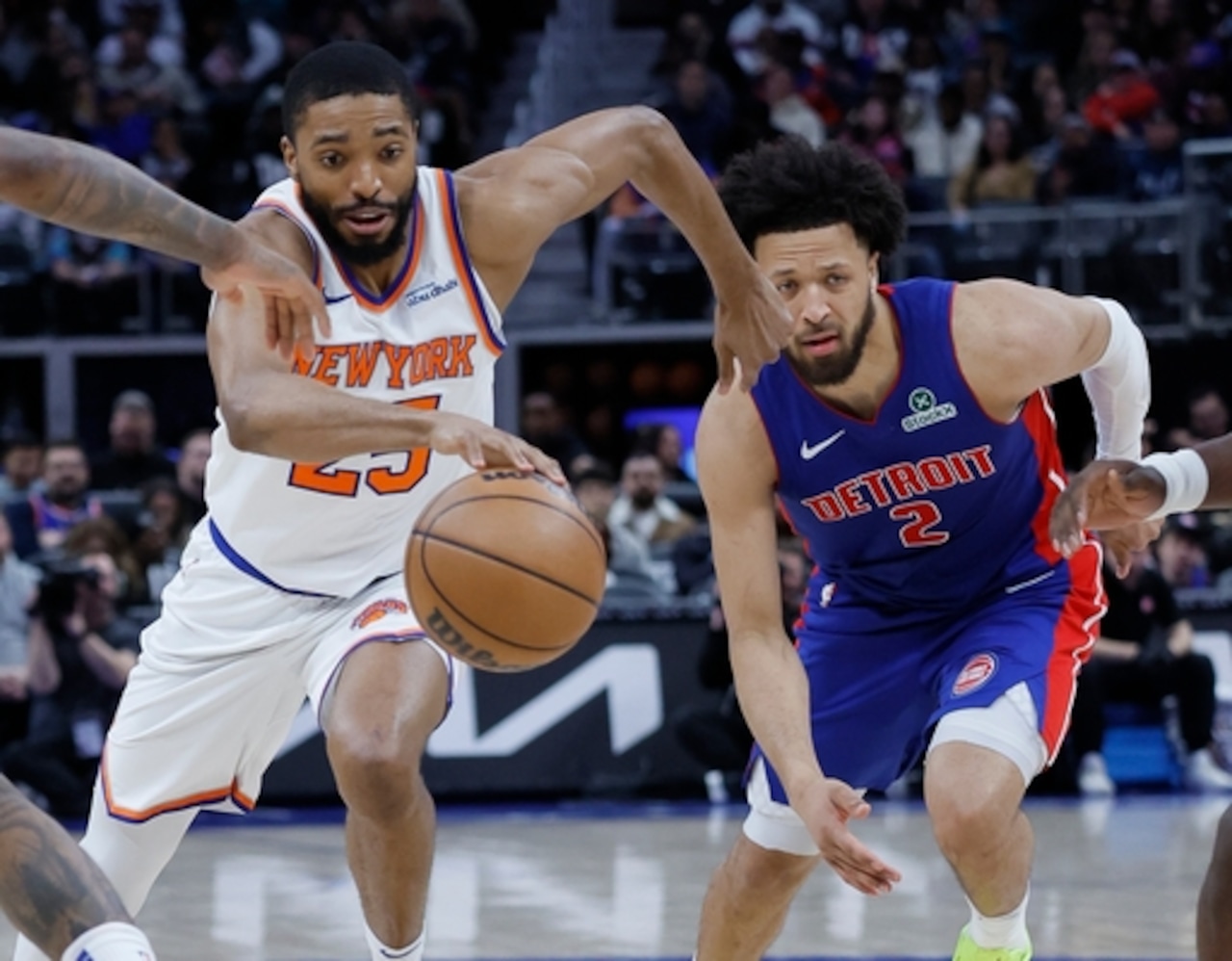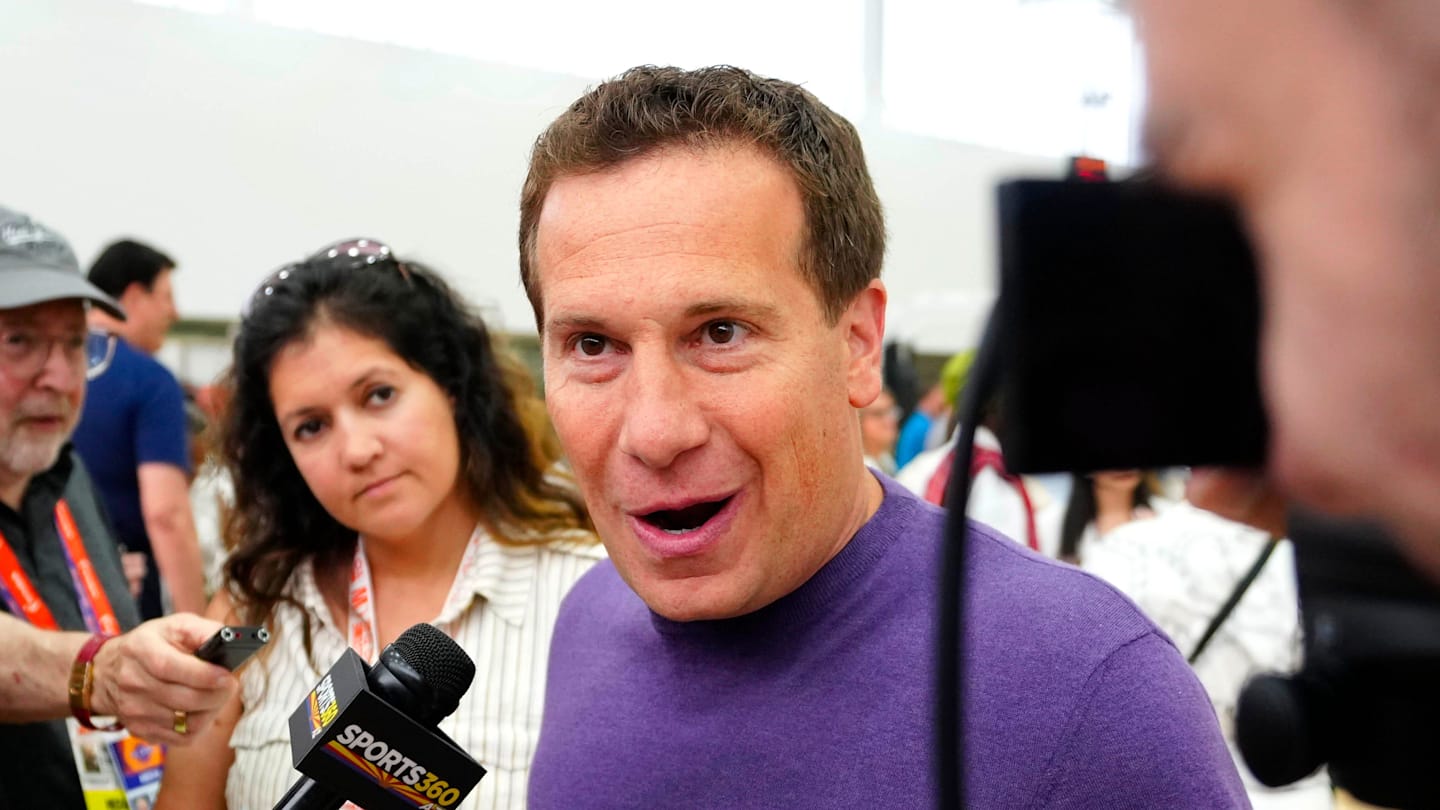CLEVELAND — Donovan Mitchell probably never had a stronger candidacy to be the NBA’s MVP than this season with the Cleveland Cavaliers.
But it’s also been a year in which Mitchell, by far, scored the fewest points since becoming the Cavs’ best player when they acquired him in the summer of 2022.
How can that be?
Advertisement
“Unselfish MVP, that’s what I call it,” said Mitchell’s backcourt mate, Darius Garland.
“The thing that always comes through is that Donovan, he empowers others — subtly, not outwardly,” said Mitchell’s coach, Kenny Atkinson. “He’s taking a very unselfish route this whole entire season,” added Cavs forward Evan Mobley. “Helping me and (Garland) as well. That — I feel like it just helps us and helps him and makes his job easier.”
Mitchell knows he is not going to win the NBA’s highest individual honor this season. The award is going to Shai Gilgeous-Alexander of Oklahoma City or Nikola Jokić of Denver; one of them was the league’s top scorer on the NBA’s best team (Gilgeous-Alexander), and the other is the reigning and three-time MVP who enjoyed the best statistical season of his career and one of the best for any player ever (Jokić).
But Mitchell may well end up in the top five for MVP candidates or could snag a spot on the All-NBA first team, two accomplishments he’s yet to achieve, even though his 24.0 points per game rank 13th among awards-eligible players and are barely above the 20.6 points Garland averaged and the career-high 18.5 points Mobley scored per game this season.
Ostensibly, Mitchell’s candidacy is based on being the best player on the Eastern Conference’s best team all season (though, again, statistically, that’s a hard argument to make. Garland averaged nearly two more assists per game than Mitchell’s 5.0, and Mobley has a serious argument for Defensive Player of the Year).
Mitchell didn’t even play that much this season, or at least he didn’t compared to his first seven pro seasons and certainly the previous two in Cleveland, where he averaged a career high in minutes. The 31.4 minutes per game he played this season was the lowest average of his career and more than four fewer minutes than he averaged in his first two years with the Cavs.
Advertisement
What’s Mitchell’s MVP case, exactly? It’s that Mitchell’s reduction in points, and in playing time, were by a design he agreed to and helped to execute, one the entire organization believes played a vital role in Mobley’s career season, in Garland’s bounce back from a tough year last year and in Cleveland’s dominance that resulted in a No. 1 seed in the East and a first-round matchup with a to-be-determined opponent that begins Sunday.
“The one thing everybody talks about — and I’ve heard it for so many years — everybody talks about sacrifice,” Mitchell said. “Everybody says you gotta sacrifice until it’s your turn, you know what I mean? And are you willing to do that for the greater good of the group?
“Statistically, this is a down year if you want to call it that. It helps we’re winning, so clearly I’m doing something right,” Mitchell continued. “This has been the best season as a group for me. And that’s really what matters — is winning.”
It was known throughout last year that Mitchell had reservations about then-coach J.B. Bickerstaff, among them Mitchell’s minutes and usage in Bickerstaff’s offense, which Mitchell felt was too basic. At the same time, Mobley’s offensive skills were not progressing as the organization had hoped, and after playing well alongside Mitchell in their first season together in 2022-23, Garland took a significant step back last year. His regression was blamed initially on a facial injury that cost him two months — his jaw was wired shut, which caused him to drop weight — but in the playoffs, Garland admitted he didn’t know what the Cavs needed from him when he was on the court with Mitchell. After Cleveland lost in the second round to the Boston Celtics, sources close to Garland suggested he would seek a trade if Mitchell signed a contract extension, but things didn’t turn out that way.
First, as expected, the Cavs dismissed Bickerstaff, even though they had improved every year under him. The Cavs replaced Bickerstaff with Atkinson, who soon hired Johnnie Bryant from the New York Knicks as an assistant coach. Bryant was also an assistant in Utah for Mitchell’s five seasons there.
Advertisement
Before it was announced that Mitchell agreed to a three-year, $150.3 million contract extension with Cleveland, he had two conversations that charted his course of self-sacrifice.
The first was with Atkinson, who, after being hired in late June, immediately flew to Los Angeles for Mitchell’s youth camp he holds each year with his shoe sponsor, Adidas. Over lunch after camp, Mitchell and Atkinson discussed Cleveland’s roster and schemes for offense and defense, using the salt and pepper shakers as props on the table.
Atkinson said Mitchell floored him with the scouting report he had for each of his teammates, saying, “he was giving a ChatGPT report on every guy. Not only the on-court stuff, but the off-court. Gave me a lot of hints on how to coach guys.”
Mitchell’s takeaway from that first chat with Atkinson was “empowerment,” he said. Not that Mitchell would feel empowered to do what he wants on the court and off, but that he had an opportunity to empower teammates to take the next step.
“I feel like I’ve always been pretty good at it, but I think there’s another layer to it,” Mitchell said.
The second, much shorter, but equally important conversation Mitchell had was with Bryant, his friend and mentor, with whom he was reuniting after spending two seasons apart following Utah’s trade of Mitchell to Cleveland.

Donovan Mitchell and Johnnie Bryant have a rare player-coach relationship and also spent time together in Utah. (Reggie Hildred / Imagn Images)
The things Bryant says to Mitchell are rare in terms of how assistants (or any coach or front-office executive, for that matter) speak to franchise superstars with six All-Star selections. For instance, before a game in early April that the Cavs needed to win to make sure they held off Boston for the No. 1 seed, Bryant approached Mitchell and asked, “Are you going to take off your ‘cool jacket’ and play some basketball today?”
It was with the same bluntness that Bryant informed, rather than asked, Mitchell last summer that he would be playing a different role in Cleveland.
Advertisement
“I know him well enough to know how to push his buttons and make him tick,” Bryant said. “A lot of it is like a mind game. … He loves challenges. So he’ll respond to that.”
This year, that challenge was nothing short of an evolution for Mitchell, one where he shot less and led more, and even one where he came off the bench after his first rest with a different starter than he was used to. Bryant suggested that the team would benefit if Mitchell was paired with Mobley instead of Jarrett Allen, the Cavs’ rim-protecting center who is now paired with Garland.
“A lot of it is where he’s at in his career,” Bryant said of Mitchell. “Eight years in, he’s played a lot of minutes. So for him, it’s like, look, we have to continue to change and evolve. He was coming off an offseason where he started late… It was one of those things (of) how can we get you through the season?
“He doesn’t like change much, he’s a creature of habit,” Bryant continued. “So really, the conversation with him has been being adaptable and being adjustable — and he’s done that.”
Mitchell’s transformation paid immediate dividends and also came with personal growing pains. Cleveland won its first 15 games, shocking the entire league, while Mitchell’s scoring was already beginning to drop. Yes, he scored 30 or more points in four of those wins, but he also had outputs of 12, 14 and 19 points. He didn’t hit the 35-minute mark in a game until Cleveland’s first loss of the season, a nailbiter Nov. 19 in Boston in which Mitchell scored 35 points in 40 minutes.
“It was like, man, coming out, it’s four minutes, my touches are down,” Mitchell said. “You’re doing something for seven years, and you’ve had success as an individual with it. It’s natural to kind of, you know, try to figure things out.”
Mitchell figured it out by looking outward. Not only was Mobley taking — and making — more 3s than he’d ever tried in his first three seasons, but Garland was zipping all over the court, bombing 3s and rifling passes through tight windows. Ty Jerome, who missed all of last season due to injury, was suddenly scoring in double digits off the bench. The Cavs were getting production from more role players like Sam Merrill, Isaac Okoro and Dean Wade, and Allen was providing his usual double-double of points and rebounds.
Advertisement
“You look yourself in the mirror and look at, ‘How do we get the most out of Evan? Get DG back to form? Getting Ty Jerome, Sam Merrill, Isaac, Dean, what does that look like?” Mitchell said. “Scoring is gonna — I’m gonna do that. But how, for me, my impact in the game at the highest level, how am I in huddles, keeping everybody calm?”
Garland and Mobley joined Mitchell as All-Stars, and right before they went to San Francisco for the NBA’s midseason classic, the team pulled a big trade for De’Andre Hunter. In Hunter, the Cavs acquired another switchable wing defender who could shoot 3s, and the team promptly won its first 15 games with him.
Mitchell missed the last two wins during that stretch (Cleveland won 16 games overall, the last 15 with Hunter on board, concluding with a strong win March 14 in Memphis). When Mitchell returned after a minor leg injury for a game against Orlando on March 16, he shot 9 of 28 in a close loss at home. The Cavs lost the next three after that, too, and Mitchell was bad in all of them, especially when he shot 2 of 18 in a loss March 21 at Phoenix.
Mitchell and the Cavs slowly rounded back into form. His best game from then until the end of the season (he missed the last four regular-season contests with an ankle sprain) was on April 2 against the Knicks, when, after Bryant asked if he would dump his “cool jacket,” he scored 27 points with six boards, five assists, three blocks and several hustle plays that swung the game in Cleveland’s favor.
Mitchell said impacting big games like that — by doing things other than scoring — is among the goals he wrote into his phone at the beginning of the season, which he said he looks at every 25 games or so.
“For years, I always thought I needed to score, that’s all I knew,” Mitchell said. “But now… for the first time in my career, yeah, I’m in the conversation for MVP. But it’s a different approach, it’s a different view on certain things.”
The best part? It’s working. And Mitchell knows it.
“He gives us a lot of room just to go be us, but also we need him to be aggressive and stay aggressive,” Garland said. “It’s finding a good balance for all of us to be successful.”
(Top photo: Nic Antaya / Getty Images)



